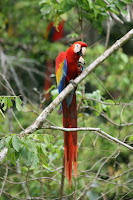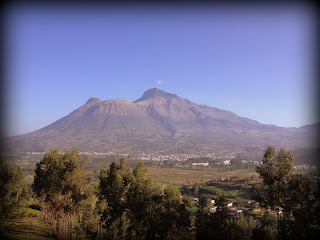The Road to Carate
“If we spoke a different language, we would perceive a somewhat different world.”
– Ludwig Wittgenstein, Austrian-British Philosopher
We end up talking about dialects, the sounds of language. He tells us that he has a hard time understanding Olman’s Spanish. “You notice people here drop their s’s.” Actually, I had noticed. “Guatemala people talk the most slow,” he points out, “like the people of your American south, yes? They speak slow, yes? Chileans, we speak the most fast, like the people of your Nuevo Yersey.” We laugh.
We roll our windows all the way down surprised to find not only a family of White-faced (Capuchin) monkeys, but the loud thrumming of the rainforest itself. For long minutes, we watch the Caras Blancas watching us, as they meticulously separate hairs, picking insects and other edibles from each other’s backs and bellies.
Two young males approach each other on a wide tree limb. One opens his mouth while the other looks inside, then they both stick out their tongues, shake their pink and white faces, their black tails twined around a smaller branch for balance as they tip sideways and drop, suddenly upside down, pendulous, tongues still wagging. We spot a single spider monkey, bigger, with rufous fur and darker face, at the edge of the group. He prefers to hang sideways, stretched like a soft hammock full of dappled sun, swaying.
But it is the sound of thousands, perhaps millions, of cicadas cloaked in the lushness of leaves that captures me. We step out of Olman’s jeep-like ‘taxi,’ my husband clicking ‘mono’ photos, me listening with my whole body. Within, a rattling, ribs vibrating. I remember: males sing, females answer with their wings. The sound is physical, palpable as the humid air with its wet mouth, its damp longing. Then a realization: All my life I’ve understood myself as something solid, animal-vegetable-mineral, soft-stone-that-breathes. Wrong. In this sound I become porous, another opening in the leaves, a gap filled with light, a portal through which the buzzing, humming, thunder of insect song pours.
– Ludwig Wittgenstein, Austrian-British Philosopher
 |
| Scarlet Macaw Photo: © Terry Schulz |
I |
t is two hours during dry season from Puerto Jimenez around the tip of Costa Rica’s Oso Peninsula to the village of Carate. There the road ends into a green wall, leaves and fronds pouring down a hidden steepness. Above, pairs of Scarlet Macaws are the only traffic. To the left, just past a short, narrow airstrip, the Pacific is truly pacific, a blue plate offering chips of light. To the right, a wild, stony incline leads to Luna Lodge and our thatched hut deep in rainforest.
But first, you must traverse this 43-kilometer road. The road is a chain of rocks and craters and free-flowing streams. Olman, our driver, knows it intimately. “Tres veces,” he says, holding up three fingers, his eyes talking to us in the rear-view mirror—many days he makes three round-trips, “a veces cuatro,” sometimes four. I imagine navigating this road in its utterly rural darkness, hoping for a near-full moon to cast shadows behind the outrcrops or let the holes be black enough to avoid, jolting through a maze of moonlight back to a sleeping family. As if reading my mind, Olman adds, “it’s okay,” followed by more Spanish, which I understand to mean, the night drives are a good time to look for pumas and pauraques (nightjars, road-loving birds). Yes, I think, but the long hours then the waking up to do it all again.
I remember why I’m here. It’s more than wanderlust. Tell me, every night don’t you hope, consciously or not, for another morning, only to find yourself by mid-day staring at dust on the windowsill? All again, all again. When you are a child, every day a new word swells in your mouth, ripening into an idea, a concept, a lens that sharpens some corner of awareness. By mid-life, there are long quiet days, a hollow behind your teeth, the eyes wander past computer and papers, looking for new, but the mouth fills only with dust, and you refuse to say it. You need a new lens. That’s when you must go, somewhere.
Sharing our ride is a young, Chilean researcher involved in developing a fair trade cooperative for farmers and artisans in Central American. His clothes give him away as a non-native, with his button-up, collared shirt and brand-name hiking boots. “I was in your country once,” he tells my husband, “Nuevo Yersey.” I hate the thought that his entire impression of the United States is based on New Jersey.
My mind flashes back to the several winter months I spent as a kid living in a trailer in Moonachie, New Jersey. The trailer park was an ice pit edged in frost-stiff candy wrappers and bits of trash, and once a frozen muskrat. I spent hours alone at a nearby marsh, watching water and bubbles of air lurching arrhythmically under inches of ice, hoping to see a live muskrat pop out of her earthen bunker. I sensed a she, and whispered to her through the glassy slab. Come out, let me see you, it’s okay, are you cold, do you have babies, it’s okay, let me see you.
I try to explain the frozen muskrat to our Chilean friend, but my Spanish is poor and muddled. He listens, nodding, “I only know the summertime in Yersey.” He talks fast, hands and face animated in his 20-something ebullience, Spanish and English swirling together. He believes he can help “the struggling people” with all the time he still has ahead of him. I manage to pick out artesanías , café, piscicultura—handicrafts, coffee, fish farming—and concepts such as getting products to the right markets, poor people don’t understand their worth, and obtaining a fair price, but I don’t fully understand what he’s telling me.
 |
| Hand-painted tiles by Mariela Zeledón (her grandfather wrote the words for Costa Rica's National Anthem) |
Then he explains that not all words can be translated because not all cultures have the same ideas. “That is why to travel is good. Your eyes see new things. Your mind gets bigger, yes?” I was about his age when I discovered Ludwig Wittgenstein’s book, Philosophical Investigations, on language and meaning. “If a lion could talk, we could not understand him,” I offer, “it’s from an Austrian philosopher.” “Yes, yes, it’s correct,” he beams, “I love this saying.” He repeats the quote to Olman in Spanish. Olman grins politely to us in the mirror, then brakes as he blurts, “Cara Blancas!” followed by “Monos!”
 |
| White-faced, or Capuchin, Monkey aka Cara Blanca Photo: © Terry Schulz |
 |
| Photo: © Terry Schulz |
| Blue Costa Rican Cicada photo: © Melissa Levan, "Mel" |
“It’s okay?” Olman asks. I don’t want to answer with words. I nod. We both smile, which requires no translation. Turning, we all climb back into our seats. We’re quiet, bumping along, chugging slowly through streams, warm wet air lurching through the windows into our faces.
We begin to see an occasional tarp, stray cots with rumpled blankets, corrugated metal lean-tos, buckets, and crooked stools made of raw sticks. Our Chilean friend tells us that the region is home to many “gold seekers” who pan the streams. “No machines, only by hand is allowed. Most gold is gone, but when a guy gets enough in his palm, he goes to Puerto Jimenez for a good time, food, drink, maybe a girlfriend, until he is broke again, then he comes back here.” Just then we pass two men in rubber boots and soiled tee-shirts, bent over the edge of a stream. One of them stands up, stretches his back, and waves. Two dogs appear out of the forest, a shiny black lab and a matted mottled terrier, trotting around the panner, nosing his hands until he leans down to let them lick his cheeks. Olman catches our eyes in the mirror, “Its, okay. Son buena gente aquí,” they are good people here.
Just before Carate, an exchange in Spanish up front, and Olman stops. Our Chilean friend steps out of the car. “This is me. Tonight I will sleep under stars with some gold seekers.” We watch him disappear into an opening in banana leaves with his backpack and some mangoes. Gone, absorbed into the rainforest.
Let me tell you about this road: it takes your body, away. Your hips rock with each dip and roll of the wheels—your waist, a spring—while your shoulders level like water, a surface your face floats above. The air smells of hot horses and bony-hipped cows (though you left them miles ago), mixed with sea thermals, the incense of strange trees simmering under a high sun, sweaty human skin pulsing on gusts of air. A few other four-wheel-drives wobble and scrape by, dust puffing into your eyes, nose, mouth, tangled hair. You can’t help drinking it all in, tasting the local dirt. It’s okay, yes, okay.
 |
| Photo: © Terry Schulz |



I like this kinda portion which is about wild life. :) I have been looking for this type of wonderful place for passing vacation. Thanks.
ReplyDeleteYou took me back to that day on the bumpy road and I could taste the dust,smell the exotic fragrances,and hear the cicadas sing.
ReplyDeleteI want to go back someday with you by myside.
Nice blog, Kimberly! I was looking for examples as I work on mine and came across yours. Keep up the nice work!
ReplyDeleteHope all is well with you these days!
Scott
have you thought about nonfiction besides poetry? I would love to see either in my new magazine, Blue Lyra Review. Just read the beautiful Moss light!
ReplyDelete